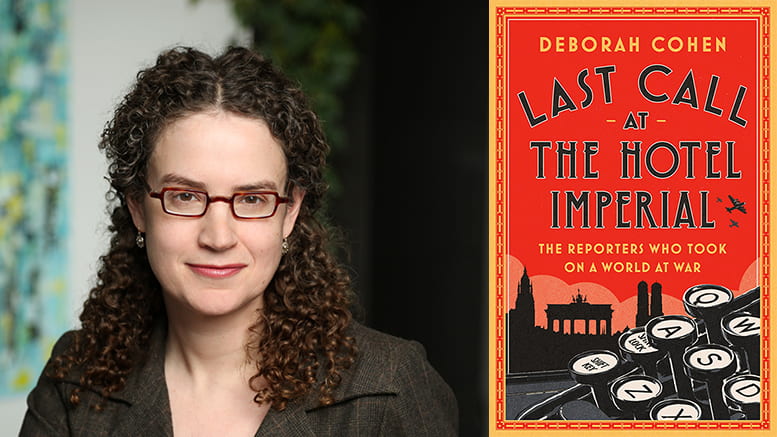Historian Deborah Cohen’s new book, Last Call at the Hotel Imperial, explores the lives of four journalists who reported from Europe and Asia during the lead-up to World War II. Cohen is the Richard W. Leopold Professor of History at Northwestern University.
The story follows John Gunther, H. R. Knickerbocker, James Vincent “Jimmy” Sheean, and Dorothy Thompson, some of the most influential correspondents of the 20th century, as they charted two of the biggest stories of their time: the rise of fascism and the anti-colonial struggle against European empires. These individual reporters inspired related films including Alfred Hitchcock’s Foreign Correspondent and Woman of the Year, starring Katharine Hepburn.
“At the start of the Second World War, Knickerbocker said this war is going to last six years. He pretty much predicted how the war was going to go. Part of what made them really good reporters was that they did have some uncanny powers of perception,” explained Cohen in an interview with On the Media.
The on-site reporting and interviews that resulted from their work served as important foundations for how we understand the 1920s and 1930s today. They were at the frontlines of the conflicts and had the first crack at interpreting the new phenomenon of modern dictatorship. They worked in the thick of dramatic and often violent events when the situations were confusing.
According to the book description:
Last Call at the Hotel Imperial is the extraordinary story of John Gunther, H. R. Knickerbocker, Vincent Sheean, and Dorothy Thompson. In those tumultuous years, they landed exclusive interviews with Hitler and Mussolini, Nehru and Gandhi, and helped shape what Americans knew about the world. Alongside these backstage glimpses into the halls of power, they left another equally incredible set of records. Living in the heady afterglow of Freud, they subjected themselves to frank, critical scrutiny and argued about love, war, sex, death, and everything in between.
Plunged into successive global crises, Gunther, Knickerbocker, Sheean, and Thompson could no longer separate themselves from the turmoil that surrounded them. To tell that story, they broke long-standing taboos. From their circle came not just the first modern account of illness in Gunther’s Death Be Not Proud—a memoir about his son’s death from cancer—but the first no-holds-barred chronicle of a marriage: Sheean’s Dorothy and Red, about Thompson’s fractious relationship with Sinclair Lewis.
Told with the immediacy of a conversation overheard, this revelatory book captures how the global upheavals of the twentieth century felt up close.
Cohen’s book has already been well-received, with positive reviews from The New York Times, The New Yorker, Wall Street Journal, Publishers’ Weekly, Kirkus, Booklist, Library Journal, and BookPage.
According to Lesley M. M. Blume from The New York Times, ‘Last Call’ provides “Grim reminders abound about the cyclical nature of history: how racial and economic resentments can lead to monstrous movements; and, above all, how human beings remain impervious to even the starkest of warnings. In the Wall Street Journal, the veteran newsman Ed Kosner praised Cohen’s prodigious research and sparkling prose,” calling the book “a model of its kind.”
As Krithika Varagur from The New Yorker writes, “ ‘Last Call’ is as effervescent, for more than four hundred pages, as its winsome and hyperactive characters, and it blends scholarly attention to ideas like psychoanalysis and Wilsonian liberal internationalism with novelistic renderings of these writers’ dizzying trajectories abroad.”
Cohen spoke with On the Media about her book and describes how the four foreign correspondents sounded the alarm on WWII and covered the biggest story of their time: the rise of the dictator. The interview is part of an episode titled, “We Were Warned.”
Listen to the interview:
Learn more about Professor Cohen’s new book.
Related:
- Read the review from The New York Times.
- Read the review from the New Yorker.
- Read the review from the Wall Street Journal.
- In The Atlantic essay, “The Book that Unleased American Grief,” Cohen described how one of the journalists, John Gunther, published a book Death Be Not Proud that chronicles his personal story of his son’s death to a brain tumor. She explains how this pivotal book “defied a nation’s reluctance to describe personal loss.”

